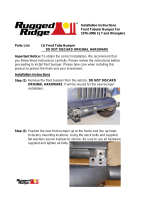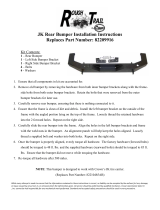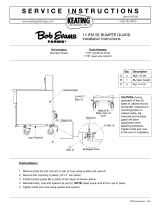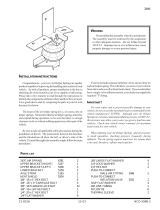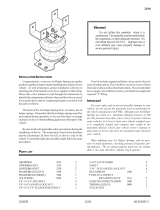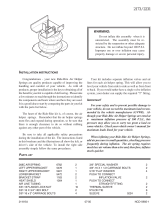Page is loading ...

Failure to read these instructions can
result in an incorrect installation.
For maximum effectiveness and safety,
please read these instructions completely
before proceeding with installation.
MN-1125 • Revision 012005 • ERN 9418
2009-2014 Ford Raptor
Kit 89412
Installation Guide
Watch the video
Info on Table of Contents page


TABLE OF CONTENTS
Video-enhanced installation guides
Visit airliftcompany.com/workshop/category/install-videos to access our installation video archive*.
* subject to availability
Installation Diagram ................................... 2
Hardware and Tools Lists ............................... 3
Introduction .......................................... 4
Notation Explanation ............................................................4
Installing the System .................................. 5
Assembling the Air Springs ......................................................10
Installing the Assemblies ........................................................11
Installing the Air Lines .................................13
Installing Braided Stainless Steel Air Lines ..........................................13
Installing the Heat Shield ........................................................ 14
Finished Installation ...................................15
Installation Checklist ...........................................................16
Maintenance and Use Guidelines .................................................16
Limited Warranty and Return Policy ...............................................16

MN-1125
2
Installation Diagram
Passenger’s
(right) Side
Fig. 1
C OR D
X
S
E OR F
L
K
U
Q
G
I
R
J
R
I
B
W
V
V
P
Y
T
O
N
M
A
U
L

MN-1125
3
Missing or damaged parts? Call Air Lift customer
service at (800) 248-0892 for a replacement part.
Missing or damaged parts? Call Air Lift customer
service at (800) 248-0892 for a replacement part.
Hardware and Tools Lists
Description ........................................................................... Qty
Hack saw or handheld grinder with a cut off wheel ...............................1
Tire marker, crayon or paint ....................................................................1
Standard and metric open-end or boxed wrenches ...........................Set
Standard and metric regular and deep-well sockets ..........................Set
Ratchet ................................................................................................... 1
9/16" Ratchet wrench .............................................................................1
Torque wrench ........................................................................................ 1
Standard and metric hex-key wrench (socket preferable) .....................1
Hose cutter, razor blade, or sharp knife ................................................. 1
Hoist and axle lift or floor jack ................................................................1
Tire chocks .............................................................................................2
Safety stands ..........................................................................................3
Safety glasses ........................................................................................1
Air compressor or compressed air source .............................................1
Spray bottle with dish soap/water solution ............................................ 1
Small wire brush ..................................................................................... 1
TOOLS LIST
Item Part# Description ...................................................... Qty
A 01531 Clamp bar ............................................................. 2
B 03875 Lower bracket ....................................................... 2
C 07079 LH upper frame bracket ........................................ 1
D 07566 RH upper frame bracket ....................................... 1
E 07788 RH upper spring bracket ....................................... 1
F 07799 LH upper spring bracket ....................................... 1
G 11686 U-bolt .................................................................... 4
H* 20987 Stainless steel braided air line .............................. 2
I 11880 Roll plate ............................................................... 4
J 58496 Air spring with jounce bumper .............................. 2
K 21804 AN type fitting ....................................................... 2
L 17363 3/8"-24 x 3/4" Flat-head socket cap screw .......... 4
M 17284 3/8"-24 x 7/8" Hex cap screw............................... 4
N 18504 3/8" Split lock washer ........................................... 4
O 18507 3/8" Flat washer .................................................... 4
P 17103 5/16"-18 x 1.0" Hex cap screw ............................. 1
Q 17134 3/8"-16 x 1.0" Carriage bolt .................................. 4
R 17490 3/8"-16 x 6.5" Carriage bolt .................................. 4
S 17366 M10 x 1.5 X 35 Button-head cap screw ............... 2
T 18203 9/16"-18 Deep nut ................................................ 8
U 18422 3/8"-16 Serrated flange lock nut ........................... 8
V 18433 5/16" Flat washer .................................................. 2
W 18438 5/16"-18 Nylon lock nut ........................................ 1
X 18444 3/8" Flat washer .................................................... 2
Y 18635 9/16" Flat Washer ................................................. 8
AA* 21813 AN to PTC fitting ................................................... 2
BB* 10466 Zip ties ................................................................ 12
CC* 18501 M8 Flat washer...................................................... 2
DD* 18411 5/16" Lock washer ................................................ 2
EE* 21709 Schrader valve with cap & nut .............................. 2
FF* 21234 Rubber washer ...................................................... 2
GG* 20084 Air line assembly ................................................... 1
Included Parts
* These parts are not shown in the Installation Diagram (Fig.1).
STOP!

MN-1125
4
Introduction
The purpose of this publication is to assist with the installation and maintenance of the LoadLifter 5000 Ultimate Plus air
spring kits. All LoadLifter 5000 Ultimate Plus kits utilize sturdy, reinforced, commercial-grade single or double, depending
on the kit, convolute bellows.
The air springs are manufactured like a tire with layers of rubber and cords that control growth. LoadLifter 5000 Ultimate
Plus kits provide up to 5,000 pounds (2,268kg) of load-leveling support with air adjustability from 5-100 PSI (.34-7BAR).
It is important to read and understand the entire installation guide before beginning installation or performing any
maintenance, service or repair.
NOTATION EXPLANATION
Hazard notations appear in various locations in this publication. Information which is highlighted by one of these
notations must be observed to help minimize risk of personal injury or possible improper installation which may render
the vehicle unsafe. Notes are used to help emphasize areas of procedural importance and provide helpful suggestions.
The following definitions explain the use of these notations as they appear throughout this guide.
INDICATES IMMEDIATE HAZARDS WHICH WILL RESULT IN SEVERE PERSONAL INJURY OR DEATH.
INDICATES HAZARDS OR UNSAFE PRACTICES WHICH COULD RESULT IN SEVERE PERSONAL INJURY OR DEATH.
INDICATES HAZARDS OR UNSAFE PRACTICES WHICH COULD RESULT IN DAMAGE TO THE MACHINE OR MINOR
PERSONAL INJURY.
DANGER
WARNING
CAUTION

MN-1125
5
Installing the System
CAUTION
IT WILL BE NECESSARY TO MOVE THE AXLE SPACER
BLOCK/JOUNCE BUMPER STRIKE PLATE FROM
ONE SIDE TO THE OTHER (FIG 3). THIS PROVIDES
CLEARANCE FOR THE AIR SPRING ASSEMBLY,
WHICH INSTALLS BETWEEN THE AXLE AND FRAME.
CARE AND SAFETY MEASURES MUST BE TAKEN TO
COMPLETE THIS TASK SAFELY AND SUCCESSFULLY.
1. With the vehicle on a hoist, block one tire in the front
and rear with chocks then lift the frame slightly to
take some pressure off the leaf springs (Fig. 2). Put a
safety stand under the front of the differential to keep
it from rotating.
Fig. 2
2. Mark the back side of each jounce bumper strike
plate/axle spacer for ease of reinstallation (Fig. 3).
Fig. 3
Back view of driver's (left) side differential
showing jounce bumper strike plate/spacer block
with mark for reference as stated in step #2

MN-1125
6
CAUTION
DO NOT RUSH THROUGH THESE NEXT STEPS. USE
ALL NECESSARY SAFETY PRECAUTIONS.
3. Remove the stock U-bolts on both driver's (left) and
passenger's (right) sides and discard. Lower the axle
assembly or raise the frame up slowly, far enough
to remove the jounce bumper strike plate/spacer
blocks from between the leaf spring and axle. Move
the driver's (left) side to the passenger's (right) side
and the passenger's (right) to the driver's (left) side
and install back between the leaf spring and axle
(Fig. 4). Ensure that the mark on the back of the
jounce bumper strike plate/axle spacer faces the
rear. The strike plate should face the wheel, leaving
the space between the frame and axle open. Drop
the frame or raise the axle assembly slowly just far
enough to hold the jounce bumper strike plate/spacer
blocks into position.
NOTE
If the jounce bumper strike plate/spacer block is not
positioned correctly, the pinion angle will be incorrect and
may cause vibration while operating.
Fig. 4
Back view of driver's (left) side differential
showing jounce bumper strike plate/spacer block
with mark for reference as stated in step #2
4. Pull the jounce bumper out of the cup and unbolt the
cup from the frame (Fig. 5).
TECH TIP
Using a wire brush, brush the rust off the bolt protruding
through the weld nut on the frame. As much as possible,
reach into the hole on the inside of the frame rail, above
where the jounce bumper cup is bolted. Use penetrating
fluid on these bolts before attempting to remove.
Fig. 5
Fig. 6
5. Remove the driver's (left) side ABS line off the ABS/
brake line junction bolted to the axle (Fig. 6) and zip
tie (BB) the ABS line to the axle vent tube.

MN-1125
7
6. Mark the location noted in Fig. 7 and cut the end of
the bracket off using a hack saw or grinder with a cut
off wheel. This will make room for the lower bracket.
Fig. 7
7. Install a zip tie around the ABS/brake lines as shown
in Fig. 8.
Fig. 8
8. Remove the emergency brake line bracket from the
axle on the front, passenger's (right) side and discard
the bolt. Let the bracket hang at this time.
9. Install the upper frame brackets (C & D) onto the
frame using the M10 bolt (S) and flat washer (X)
(Fig. 9). Push the brackets against the frame and
torque the mounting hardware to 52Nm (38 lb.-ft.)
Fig. 9
X
S
Driver's (left) side upper frame
bracket and hardware shown
C or D

MN-1125
8
10. Set a lower bracket (B) onto the passenger's (right)
side axle (Fig. 10) and insert the 5/16" hex cap screw
(P) through a 5/16" flat washer (V) through the lower
bracket, from the leaf spring side of the bracket, to
the inside (toward the center of the vehicle). Push the
bolt up against the bracket.
Fig. 10
P
B
V
11. Set the other lower bracket onto the driver's (left)
side. Position both lower brackets so they are up
against the leaf spring and jounce bumper strike
plate/axle spacer assembly. Set the U-bolts (G) into
position forward and rearward of the axle. Ensure
inside legs of both U-bolts go through the holes in the
lower bracket (Fig. 11).
NOTE
It may be necessary to trim the ABS/brake line bracket
previously modified if the lower bracket does not fit into
position without interference.
Fig. 11
G
G
12. Once the lower brackets are in position and the
U-bolts are in place, install the passenger’s (right)
emergency brake cable bracket onto the bolt
previously installed (Fig. 12) making sure the “tab” on
the bracket indexes in the space between the lower
bracket and axle. Cap with a flat washer (V) and nylon
lock nut (W). Leave loose at this time.
Fig. 12
W
V

MN-1125
9
13. Insert the carriage bolts (R) down through the holes
in the upper bracket (Fig. 13), making sure the rear
carriage bolts go between the hard brake lines and
the axle (Fig. 14). Turn the heads of the carriage bolts
so they index into the square holes in the bracket.
Fig. 13
R
14. Raise the axle assembly or lower the body all the way
so that the leaf spring is supporting the vehicle. Set
the lower axle/spring retainer over the U-bolts and
cap with 9/16" flat washers (Y) and 9/16" deep nuts
(T). Tighten finger-tight only at this time.
NOTE
Make sure the lower axle/spring retainer aligns with the
wear marks on the axle before torqueing U-bolts.
Install the lower clamp bar (A) over the carriage bolts
previously installed and cap with 3/8" serrated flange
lock nuts (U). Tighten finger-tight only at this time
(Fig. 14).
Fig. 14
T
Y
A
U
15. In a criss-cross pattern, evenly torque the U-bolts to
90 lb.-ft. (122Nm). Once all the U-bolts have been
torqued, torque the 3/8" lower bracket axle clamp
hardware to 16 lb.-ft. (22Nm). On the passenger's
(right) side, securely tighten the emergency brake
cable bracket hardware previously installed.
NOTE
U-bolts must be retorqued after 100 miles.

MN-1125
10
ASSEMBLING THE AIR SPRINGS
1. Set a roll plate (I) onto the top of the air springs
(J) and install the fittings (K) into the top of the air
spring finger-tight. Tighten the fitting an additional
1 1/2 turns (Fig. 15).
Fig. 15
I
K
J
2. Insert a 3/8" carriage bolt (Q) into the square hole
of the right-hand upper spring bracket (E) on the
opposite side of the tapered holes as shown in
Fig. 16. Set the bracket onto the air spring assembly
and install with two flat head screws (L). Torque the
screws to no more than 20 lb.-ft. (27Nm). Install the
braided hose (H) onto the fitting previously installed
and turn one flat (see Installing the Air Lines section
for reference).
Fig. 16
Q
L
E
H
3. Set the left-hand upper spring bracket (F) onto the
remaining air spring and attach with two flat head
screws (L). Install the braided hose (H) onto the fitting
previously installed and turn one flat. Fig. 17 shows a
picture of both left- and right-hand assemblies ready
to be installed.
Fig. 17

MN-1125
11
INSTALLING THE ASSEMBLIES
1. Lower the axle assembly or raise the frame
once again, just far enough so that the air spring
assemblies can be put in place between the upper
and lower bracket. While positioning the driver's (left)
assembly into position above the axle, insert the hose
in between the brake lines and wiring harness as
shown in Fig. 18. Route the hose over the frame and
to the back or side of the vehicle (see Installing the
Air Lines section for reference). Do the same for the
passenger's (right) side assembly.
Fig. 18
2. While lifting up on the assemblies, insert two 3/8"
carriage bolts (Q) up through the air spring bracket
and frame bracket (Fig. 19).
NOTE
The passenger's (right) side already has one of the 3/8"
carriage bolts installed.
Cap with the 3/8" serrated flange lock nuts (U).
Torque hardware on both sides to 31 lb.-ft. (42Nm).
Fig. 19
U
Q
3. Set a roll plate (I) onto the lower bracket below the
air spring assembly (Fig. 20). Align the holes in the air
spring/roll plate/lower bracket as much as possible.
Raise the axle assembly up or lower the frame just far
enough so that the air spring sits on the lower bracket
(Fig. 21).
Fig. 20
I
Fig. 21

MN-1125
12
4. Insert a 3/8" hex cap screw (M) through a split lock
washer (N) and flat washer (O) then attach the air
spring to the lower bracket by inserting the assembly
up through the slot in the lower bracket (Fig. 22).
Push the air spring so that the hardware is to the
back of the slot and tighten the hardware securely.
TECH TIP
A 9/16" ratchet wrench works well in tightening this
hardware.
Fig. 22
O
N
M
5. Raise the axle assembly or lower the frame of the
vehicle. Remove the safety stands and wheel chocks.
On the inside frame of the driver's (left) side above
the air spring assembly, make sure that the brake
lines and wiring harness are not rubbing on the steel
braided air line (Fig. 23). If they are, carefully bend the
brake line away from the air line to obtain clearance.
For the wiring harness, it may be necessary to pry the
line holder out of the frame and pull away from the air
line to obtain enough clearance.
Fig. 23
6. Do the same for the brake lines behind the axle, make
sure there is enough clearance between the carriage
bolt and the brake line. Pull the line away if it is hitting
on the carriage bolt (Fig. 24).
Fig. 24

MN-1125
13
Installing the Air Lines
* For LoadLifter 5000 Ultimate Plus kits, the recommended location
for the Schrader valves is the rear bumper area or license plate.
MICHIGAN
XXX-XXX
www.MICHIGAN.gov
A.
B.
C.
B. Inside rear
wheel wells
A. Inside fuel
tank filler door
C. License plate or
rear bumper area*
Fig. 25
INSTALLING BRAIDED STAINLESS
STEEL AIR LINES
CAUTION
KEEP THE AIR LINE AWAY FROM THE FUEL LINE,
BRAKE LINES AND ELECTRICAL WIRES.
NOTE
The braided stainless steel air line must be routed to the
rear of the vehicle. Install the air line through one of the
openings between the upper coil spring mount and the
frame and then back to the rear where the inflation valves
will be mounted (Fig. 25).
1. Use zip ties to secure the air line to fixed points along
the chassis every 6" to 8" (150-200mm). Leave at
least 2" (50mm) of slack to allow for any movement
that might pull on the air line.
Fig. 26
Hex nuts
Star washer
Rubber washer
Air Line Setup Without Compressor System
Flat
Vehicle body
or bumper
Braided stainless steel
air line to air spring
5/16” (8mm)
hole
AN
Schrader
valve
Air line hex nut
Flat washer
2. Tighten the air line hex nut finger-tight, then use 2
wrenches to turn 1 additional flat (1/6 of one full turn).
Do not overtighten (Fig. 26 & Fig. 27). The easiest
way to tighten the fitting is off the vehicle. Install the
Schrader valve in the chosen location.
3. Coil and secure any excess air line in an area where
it will not be susceptible to damage. The braided
stainless steel air line cannot be trimmed.
Air Line Setup for Compressor Integration
Nylon air line
to compressor
system and
Schrader valve
Flat
AN to PTC
fitting
Braided
stainless
steel air line
to air spring
Fig. 27

MN-1125
14
INSTALLING THE HEAT SHIELD
1. Install the heat shield above the air spring assembly on
the inside pipe as shown in Fig. 28.
Fig. 28
2. Bend the heat shield up so that it is between the pipe
and the air line (Fig. 29 & Fig. 30).
Fig. 29
1/2” (13mm)
dead air space
between shield
and exhaust
Fig. 30

MN-1125
15
Finished Installation
The images show the finished installation of both sides (Fig. 31 - Fig. 34).
Driver’s (left) side behind the axle view. Fig. 31 Driver's (left) side inside above
the axle assembly view.
Fig. 32
Passenger's (right) forward axle view.
Fig. 33
Passenger's (right) inside above the
axle view.
Fig. 34

MN-1125
16
MAINTENANCE AND USE GUIDELINES
1. Check air pressure weekly.
2. Always maintain normal ride height. Never inflate beyond 100 PSI (7BAR).
3. If the system develops an air leak, use a soapy water solution to check all air line connections and the inflation
valve core before deflating and removing the air spring.
Maximum Air Pressure
100 PSI (7BAR)
Minimum Recommended Pressure
5 PSI (.34BAR)
CAUTION
FOR SAFETY AND TO PREVENT POSSIBLE DAMAGE TO THE VEHICLE, DO NOT EXCEED MAXIMUM GROSS
VEHICLE WEIGHT RATING (GVWR) OR PAYLOAD RATING, AS INDICATED BY THE VEHICLE MANUFACTURER.
ALTHOUGH THE AIR SPRINGS ARE RATED AT A MAXIMUM INFLATION PRESSURE OF 100 PSI (7BAR), THE AIR
PRESSURE ACTUALLY NEEDED IS DEPENDENT ON LOAD AND GROSS VEHICLE WEIGHT RATING.
LIMITED WARRANTY AND RETURN POLICY
Air Lift Company provides a limited lifetime warranty to the original purchaser of its load support products, that the
products will be free from defects in workmanship and materials when used on cars and trucks as specified by Air
Lift Company and under normal operating conditions, subject to the requirements and exclusions set forth in the full
Limited Warranty and Return Policy that is available at www.airliftcompany.com/warranty.
For additional warranty information contact Air Lift Company customer service.
INSTALLATION CHECKLIST
Clearance test — Inflate the air springs to 40-60
PSI (2.8-4.1BAR) and make sure there is at least 1/2"
(13mm) clearance from anything that might rub against
each sleeve. Be sure to check the tire, brakes, frame,
shock absorbers and brake cables.
Leak test before road test — Inflate the air springs to
40-60 PSI (2.8-4.1BAR) and check all connections for
leaks. All leaks must be eliminated before the vehicle is
road tested.
Heat test — Be sure there is sufficient clearance from
heat sources, at least 6" (152mm) for air springs and
air lines. If a heat shield was included in the kit, install
it. If there is no heat shield, but one is required, call Air
Lift customer service at (800) 248-0892.
U-bolt - After 100 miles (161km), retorque U-bolts.
Fastener test — After 500 miles (800km), recheck all
bolts for proper torque.
Road test — The vehicle should be road tested
after the preceding tests. Inflate the air springs to
recommended driving pressures. Drive the vehicle
10 miles (16km) and recheck for clearance, loose
fasteners and air leaks.
Operating instructions — If professionally installed,
the installer should review the operating instructions
with the owner. Be sure to provide the owner with all of
the paperwork that came with the kit.

MN-1125
17
Notes

California: WARNING: Cancer and Reproductive Harm – www.P65Warnings.ca.gov
JJC-0520
Printed in the USA
Air Lift Company reserves the right to make changes and improvements to its products and publications at any time.
For the latest version of this manual, contact Air Lift Company at (800) 248-0892 or visit airliftcompany.com.
Air Lift Company • 2727 Snow Road • Lansing, MI 48917 or P.O. Box 80167 • Lansing, MI 48908-0167
Thank you for purchasing Air Lift Products — the Authorized Installer's choice!
Need Help?
Contact Air Lift Company Customer Service at (800) 248-0892
or email service@airliftcompany.com.
For calls outside the U.S. or Canada, dial (517) 322-2144.
/
